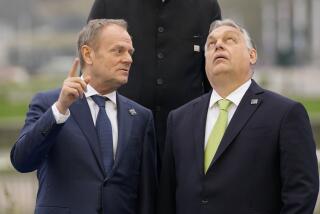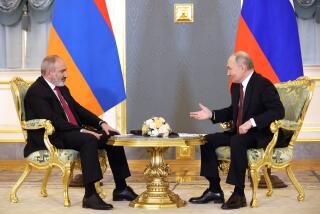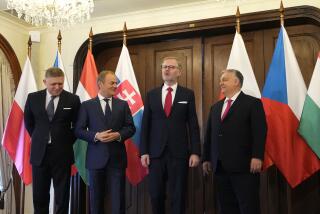Gorbachev, Jaruzelski Meet; Soviet Concerns Indicated
- Share via
WARSAW — Soviet leader Mikhail S. Gorbachev met Saturday with Polish Premier Wojciech Jaruzelski amid indications that Moscow remains concerned about Poland’s economic ills and its continuing political tensions.
A joint Polish-Soviet communique, released as Gorbachev, Foreign Minister Andrei A. Gromyko and Communist Party Secretary Konstantin V. Rusakov flew home to Moscow, was notable for its lack of praise for Jaruzelski’s leadership and for the absence of any expressions of confidence in his ability to solve Poland’s internal problems.
The three Kremlin officials remained in Warsaw overnight for previously unannounced talks following a one-day meeting on Friday of the seven Warsaw Pact countries that extended the Soviet-led military alliance.
The Warsaw summit was Gorbachev’s first trip outside the Soviet Union since his accession to power last month after the death of Soviet President Konstantin U. Chernenko. Western diplomats said he apparently used the opportunity to gain a first-hand view of Jaruzelski’s daunting--and often conflicting--tasks of reviving the economy, reconciling an embittered people, suppressing opposition within the Solidarity trade union and curbing Roman Catholic clergymen who support the outlawed labor movement.
“The Soviets can’t be very happy about the situation as it now stands,” said one Western diplomat, who noted a widespread impression among Poles as well as foreigners that the regime seems paralyzed.
One reason for the paralysis appears to be that orthodox Marxist hard-liners in the Politburo are pressuring Jaruzelski to step up propaganda attacks against the church and repressive measures against the Solidarity opposition. While these actions may be satisfying to the hard-liners, they work against the regime’s efforts to win public confidence in its economic recovery program, which includes painful increases in food prices.
Slipping Behind on Debt
The Polish economy is growing very slowly and still slipping behind in interest payments on its Western debt, which is now approaching $29 billion.
“Quite probably, Jaruzelski was asking Gorbachev for help in restraining the hard-liners,” one diplomat said.
The joint statement issued as the Soviets left Warsaw in mid-afternoon was brief and bland, and coolly devoid of any signs of sympathy for Jaruzelski’s plight. It was consistent with the view of a prominent Polish journalist, who said privately several weeks ago that the Soviets are “letting Jaruzelski dangle” without any visible support in his contest with the hard-liners.
The statement released Saturday by the official Polish news agency PAP contained stock phrases of unanimity on foreign policy, expressed “satisfaction” at the course of Polish-Soviet relations and said the meetings took place in a spirit of “unity and cordial friendship.”
However, in the only section dealing with Poland’s internal problems, the Soviets omitted standard expressions of mutual understanding and confidence in the present leadership, and instead merely repeated their general support for the Polish Communist Party’s efforts to overcome the country’s crises.
“The Soviet side has reiterated its unchanging solidarity with the struggle of the Polish United Workers’ (Communist) Party and Poland’s working people for fully overcoming the effects of the crisis, for stability and for strengthening the position of socialism,” the statement said.
Gromyko reportedly met with Stefan Olszowski, the Polish foreign minister and a Politburo hard-liner. Rusakov, the Soviet party secretary in charge of relations with other ruling Communist parties, met with Polish party secretary and Politburo member Jozef Czyrek, a Jaruzelski ally.
As the Soviets departed, Solidarity leader Lech Walesa issued a statement saying that repression in Poland is growing, while the government has failed to implement its promised economic reforms. “There is still no justice and we still have no possibility to create trade unions freely,” he said in a recorded phone message from Gdansk. “There is still no freedom. The system of repression has been expanded.”
Underground Solidarity activists have called for demonstrations on the official May Day holiday to protest price increases and demand higher wages. While avoiding a direct call for protests, Walesa’s message said May Day symbolizes “the organized struggle of workers for justice, bread and freedom,” and added, “this struggle continues, and we cannot this year in Poland celebrate its victorious end.”
More to Read
Sign up for Essential California
The most important California stories and recommendations in your inbox every morning.
You may occasionally receive promotional content from the Los Angeles Times.













